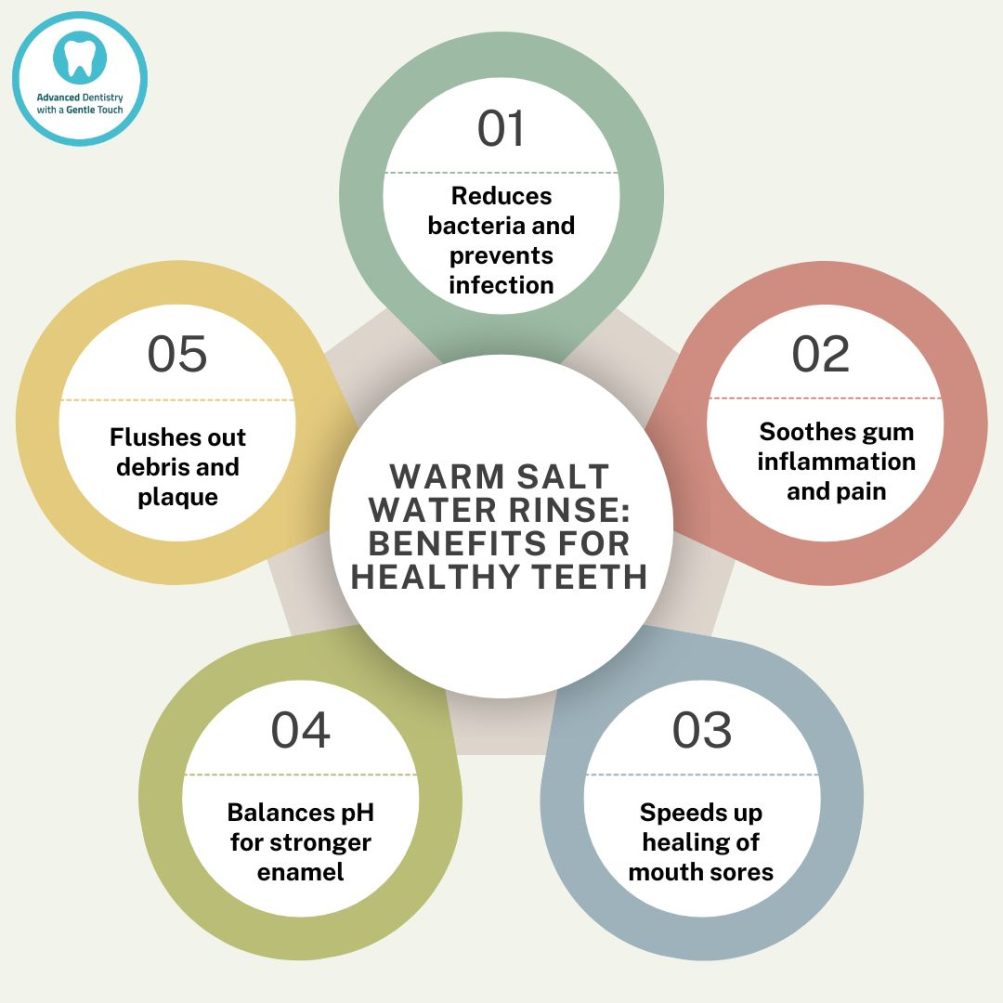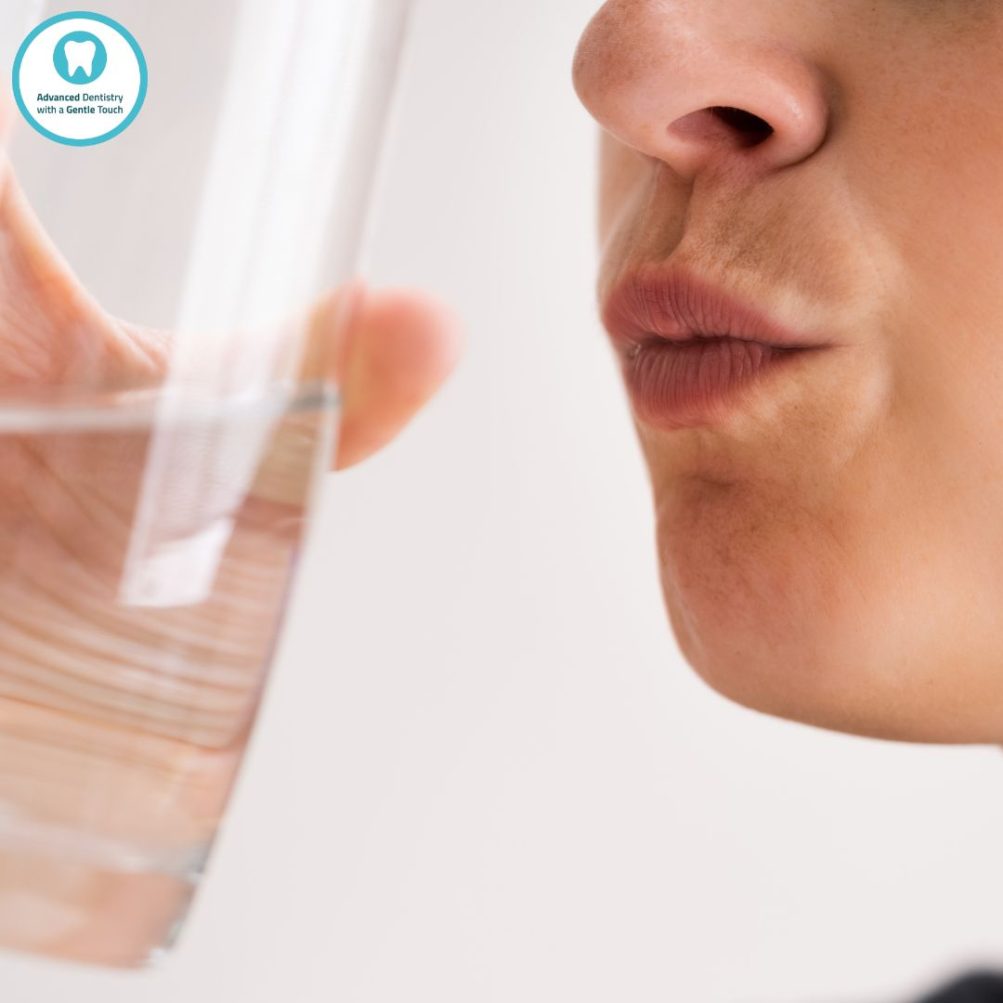Warm Salt Water Rinse: Benefits for Healthy Teeth

Many people struggle with gum irritation, bad breath, or mouth sores and wonder about simple home remedies. Is warm salt water rinse good for teeth? This common question highlights the need for safe, natural solutions in oral care. A warm salt water rinse is one such remedy, known for its ability to reduce bacteria, soothe gums, and support oral health.
A warm salt water rinse is a simple mixture of salt and warm water, used to cleanse the mouth and promote healing. It’s an affordable, chemical-free solution that can be made at home in seconds. Unlike some mouthwashes with alcohol or harsh ingredients, it offers a gentle, natural way to improve oral hygiene.
Studies show that salt water helps reduce harmful bacteria, balance pH levels, and speed up the healing process after minor dental procedures. Dentists often recommend it for soothing sore throats, reducing inflammation, and protecting teeth and gums. Whether you have gum disease, canker sores, or just want to freshen your mouth, a warm salt water rinse can be a valuable addition to your daily routine.

How Warm Salt Water Works in the Mouth
The Science Behind Salt Water Rinse
A warm salt water rinse helps maintain oral hygiene by creating an alkaline environment in the mouth. Harmful bacteria thrive in acidic conditions, but salt water raises the pH balance, making it harder for bacteria to survive. This natural shift reduces the risk of plaque buildup, bad breath, and gum disease.
Salt water also has an osmotic effect, meaning it pulls out fluids from inflamed tissues. This helps reduce swelling, soothe sore gums, and speed up the healing process. If you've had a dental procedure or a minor mouth sore, a salt water rinse can promote faster recovery by keeping the area clean and reducing inflammation.
Another benefit is its ability to break down bacterial biofilm—a sticky layer of bacteria that forms on teeth and gums. By disrupting this layer, salt water helps prevent plaque formation, supporting long-term oral health. It’s a natural way to protect your teeth and gums without using harsh chemicals.
What Happens When You Use a Salt Water Rinse?
When you rinse your mouth with warm salt water, it soothes irritation and inflammation, making it ideal for people with canker sores, gum disease, or oral sensitivity. The gentle rinse cleanses inflamed tissues, offering relief without irritation.
See also Maintaining Dental Health When Hormones Change in Adolescence
It also flushes out debris and food particles from areas that are hard to reach with a toothbrush. This helps keep your mouth clean, reducing the risk of infection and decay. Unlike sugary or acidic mouthwashes, salt water is a natural cleanser that won’t damage tooth enamel.
Another key benefit is its ability to neutralize acidity in the mouth, lowering the risk of cavities and bad breath. By maintaining a healthy pH balance, salt water rinses help protect teeth and gums, making them a simple yet effective addition to any oral care routine.

Key Benefits of Warm Salt Water Rinse
Fights Bacteria and Prevents Infection
A warm salt water rinse has natural antibacterial properties that help kill harmful bacteria in the mouth. This makes it an excellent way to reduce the risk of gum disease, cavities, and oral infections. Unlike commercial mouthwashes that contain alcohol, salt water is a gentle, chemical-free alternative that won’t cause dryness or irritation.
It’s especially useful after dental procedures like extractions, fillings, or root canals. Dentists often recommend rinsing with salt water to keep the wound clean, reduce swelling, and prevent infection. By washing away harmful bacteria and debris, it supports a faster, safer healing process.
Helps Heal Mouth Sores and Ulcers
Salt water is known to speed up the healing process of minor oral wounds, including canker sores, cuts, and burns inside the mouth. Its osmotic effect draws out excess fluid from damaged tissues, reducing swelling and discomfort.
By creating a clean environment, salt water also helps prevent secondary infections in open wounds. Whether it’s a bitten cheek, a sore from braces, or a minor burn, using a salt water rinse can promote faster recovery while keeping bacteria in check.

Reduces Gum Inflammation (Gingivitis and Periodontitis Support)
Inflamed gums are often a sign of gingivitis or periodontitis, two common forms of gum disease. Rinsing with warm salt water helps reduce swelling, redness, and irritation, providing relief for sensitive gums.
Salt water also lowers bacterial buildup in the mouth, which is a key factor in the development of gum disease. While it’s not a cure for severe conditions, it can help manage early signs of gingivitis and improve overall gum health.
Alleviates Sore Throat and Tonsil Discomfort
A warm salt water gargle is a well-known remedy for sore throats and tonsil discomfort. The antibacterial properties help kill bacteria that cause throat infections, while the soothing effect reduces pain and inflammation.
See also Insight into Immune Response from Periodontal Bacteria
Regular gargling with salt water can also help flush out mucus and bacteria trapped in the throat, promoting faster relief. Whether dealing with a mild sore throat or recovering from tonsillitis, this simple rinse offers a natural way to ease discomfort and support throat health.
How to Use a Warm Salt Water Rinse Properly
Step-by-Step Guide
Using a warm salt water rinse the right way ensures you get the most benefits for oral health. Follow these simple steps for an effective rinse:
- Mix the right amount: Dissolve ½ to 1 teaspoon of salt in a cup of warm water. The water should be warm but not too hot, as extreme temperatures can irritate the mouth.
- Swish and gargle: Take a sip of the solution and swish it around your mouth for 30 seconds to 1 minute. If needed, tilt your head back and gargle, especially if soothing a sore throat or tonsil irritation.
- Spit it out: Never swallow the salt water, as it can lead to dehydration or an upset stomach.
- Repeat as needed: Rinse 2–3 times daily, especially after meals and before bed to remove food particles and maintain oral hygiene.
Best Practices for Maximum Effectiveness
To ensure the best results, follow these tips when using a salt water rinse:
- Use warm, not hot water: Water that’s too hot can burn sensitive tissues in the mouth and throat. Warm water is soothing and allows salt to dissolve more effectively.
- Choose the right salt: Sea salt or Himalayan salt contains additional minerals that may help support gum health compared to refined table salt.
- Avoid overuse: While a salt water rinse is beneficial, using it too often can dry out the mouth, leading to discomfort or irritation. Stick to 2–3 times per day unless advised otherwise by a dentist.
- Pair with good oral hygiene habits: A salt water rinse helps clean the mouth but does not replace brushing and flossing. Continue brushing twice daily, flossing, and scheduling regular check-ups with a dentist near you to maintain healthy teeth and gums.
- Be Cautious: Use caution if you have high blood pressure and follow your physician's advice on salt intake before starting this program.

When to Use a Salt Water Rinse
After Dental Procedures
A salt water rinse is commonly recommended after dental procedures such as extractions, implants, or gum treatments. It helps reduce swelling, prevent infection, and speed up healing. By flushing out food particles and bacteria, it keeps the surgical site clean without irritating the tissues. Many dentists near you, including Dr. Korwin, a Red Bank dentist, suggest using a warm salt water rinse multiple times a day during recovery.
See also Dr. Robert Korwin: "Implant Planning Has Come a Long Way" - Dental Product Shopper
For Gum and Tooth Pain Relief
If you experience mild toothaches or gum pain, a warm salt water rinse can help reduce inflammation and soothe discomfort. The osmotic effect of salt water draws out fluid from swollen gums, providing relief for gingivitis or sore gums. It can also help sensitive teeth by keeping bacteria levels low and reducing acidity in the mouth. However, if pain persists, it's best to visit a dentist in Middletown, NJ for further evaluation.
As a Daily Preventive Measure
Using a salt water rinse regularly can help maintain oral hygiene by keeping bacteria levels in check. It prevents bad breath, reduces plaque formation, and lowers the risk of gum disease. People who are prone to gingivitis or dry mouth can benefit from rinsing with salt water before bed to support their teeth and gums. While it’s not a substitute for brushing and flossing, it’s a simple, natural way to support long-term oral health.
Conclusion
A warm salt water rinse is a simple, effective home remedy that supports oral health in many ways. It helps reduce harmful bacteria, promote healing, and maintain gum health. Whether you’re dealing with gum inflammation, mouth sores, or recovering from a dental procedure, rinsing with salt water can provide soothing relief and protection.
While salt water rinses offer many benefits, they are not a replacement for professional dental care. Brushing, flossing, and regular visits to a dentist near you remain essential for maintaining healthy teeth and gums. If you have ongoing gum pain, tooth sensitivity, or other oral health concerns, consulting a dentist in Middletown, NJ, or Red Bank, NJ, can help ensure proper treatment.
Incorporating a salt water rinse into your daily routine is an easy, natural way to support oral hygiene. By using it after meals or before bed, you can help keep your mouth clean and fresh. Remember, good oral health starts with daily care and regular check-ups, so be sure to schedule visits with your dentist to maintain a healthy, confident smile.
